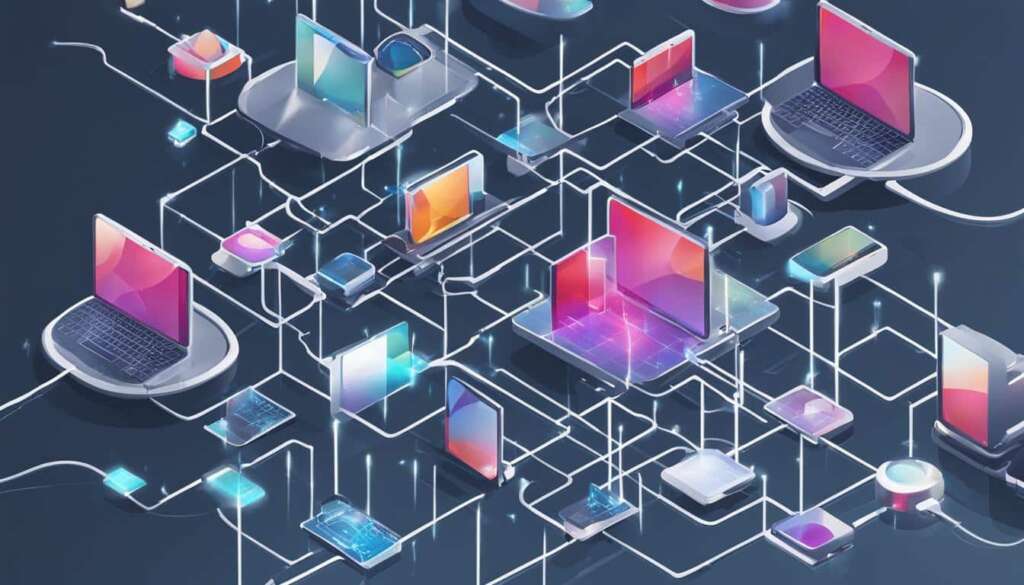Table of Contents
In today’s digital age, the term “digitised” has become ubiquitous, but what does it really mean? Simply put, digitisation involves converting analog data or physical objects into a digital format. From books to movies, music to photographs, digitisation has transformed the way we interact with the world around us.
The significance of digitisation cannot be overstated, as it has the power to revolutionize industries, create new opportunities, and enhance efficiency. In this section, we will explore the key insights and facts surrounding digitisation, shedding light on its transformative power.
Key Takeaways
- Digitisation involves converting analog data or physical objects into a digital format
- Digitisation has revolutionized industries, creating new opportunities and enhancing efficiency
- Books, movies, music, and photographs are just a few examples of what can be digitized
- Digitisation has transformed the way we interact with the world, offering improved accessibility and storage efficiency
- The process of digitisation continues to evolve, with emerging technologies poised to further transform the digital landscape
Understanding the Process of Digitisation
In today’s digital age, the process of digitisation has become an increasingly important topic. Digitisation refers to the conversion of analog data or physical objects into digital formats. The process of digitisation involves various techniques and technologies that have revolutionised industries across the board.
Digital images, audio recordings, and video recordings are some examples of digitised data. The process of digitising these types of data involves taking a snapshot of the data and converting it into a digital form. This can be achieved through scanning or recording the data using digital equipment.
Furthermore, the process of digitisation involves cleaning up the data to ensure accuracy and consistency. This is usually done through manual editing or automated software programs. Once the data is cleaned up, it can be stored, transferred, and manipulated with greater ease and efficiency.
One crucial aspect of the process of digitisation is metadata. Metadata refers to the information that is associated with digitised data and provides context and description about the data. Metadata can include information such as date created, author, and type of data. This information is crucial in data management and retrieval.
In addition, digitisation has led to the development of new digital technologies that have made it possible to convert more complex physical objects to digital formats. For instance, 3D scanning technology has made it possible to create digital models of physical objects.
Overall, the process of digitisation has transformed the way we store and manage data. With the advent of new technologies, the process of digitisation is set to continue to evolve and revolutionise various industries.
Impacts and Benefits of Digitisation
Digitisation has brought about significant impacts and benefits in various aspects of our lives. In the business world, digitisation has revolutionised operations, enabling remote work, improving collaboration, and boosting efficiency. Education has become more accessible through digital platforms, providing learners with flexibility and a wealth of resources.
Healthcare has also seen benefits from digitisation, including improved record-keeping, enhanced patient care, and the development of telehealth services. In entertainment, digitisation has transformed the way we consume media, from streaming services to online gaming.
The benefits of digitisation extend beyond convenience and accessibility. It has also led to improved storage efficiency, reduced environmental impacts, and enhanced decision-making capabilities. Decision-makers can now access data in real-time and make informed decisions, improving overall productivity and performance.
Digitisation in Numbers
| Aspect | Percentage increase after digitisation |
|---|---|
| Business productivity | 33% |
| E-learning participation | 46% |
| Hospital efficiency | 25% |
| Environmental sustainability | 57% |
Digitisation has impacted our lives in countless ways, with its benefits expected to increase as new technologies emerge. The Fourth Industrial Revolution, with technologies such as artificial intelligence and the Internet of Things, will further transform the digital landscape, providing us with new opportunities and challenges.
What Is Digitised and Its Future Prospects
Digitisation has revolutionised various aspects of our lives, from how we work and play, to how we access and share information. So what exactly can be digitised? The answer is, quite a lot. Documents, photographs, music, and videos are some examples of the more common digitised objects. However, technological advancements have opened up possibilities to digitise more complex objects, including buildings and even human experiences.
Looking ahead, the future prospects of digitisation are even more exciting. With emerging technologies like artificial intelligence, Internet of Things (IoT), and virtual reality (VR), the digital landscape is poised to experience further transformation. AI provides the ability to analyse and interpret massive amounts of data in real-time, enabling unprecedented insights and decision-making capabilities. IoT involves connecting devices and objects to the internet, facilitating seamless communication and collaboration between them. VR, on the other hand, presents a whole new world of immersive digital experiences, with applications ranging from entertainment to training and education.
“Digitisation has the potential to change traditional business models and create new value propositions, products, and services, leading to radical changes in the way we live and work.”
As more objects become digitised and new technologies emerge, the possibilities of what we can achieve in the digital world are endless. The key is to embrace these changes and harness their transformative power to drive innovation and enhance efficiency in the digital age.
Conclusion
In conclusion, digitisation plays a crucial role in shaping our world today. The process of digitising analog data and physical objects has opened up new possibilities and opportunities across various fields. By embracing digitisation, businesses and individuals can harness its transformative power to drive innovation and enhance efficiency in the digital age.
FAQ
What is digitisation?
Digitisation refers to the process of converting analog data or physical objects into digital formats. It involves capturing, storing, and reproducing data in a digital form, enabling easier access and manipulation.
Why is digitisation significant in today’s world?
Digitisation is significant because it has the power to transform industries and improve various aspects of our lives. It allows for easier and quicker access to information, enhances efficiency, and opens up new opportunities for innovation.
What are the impacts of digitisation?
Digitisation has profound impacts on businesses, education, healthcare, and entertainment. It enables streamlining of processes, improved communication, and customization of products and services. Additionally, it enhances the accessibility of information and promotes global collaboration.
What are the benefits of digitisation?
Digitisation brings numerous benefits. It improves accessibility, making information available anytime and anywhere. It also enhances storage efficiency by eliminating the need for physical space. Furthermore, digitisation allows for better decision-making by providing data analytics and insights.
What can be digitised?
A wide range of things can be digitised, including documents, photographs, music, videos, and books. Additionally, more complex objects like buildings and human experiences can also be digitised. The possibilities for digitisation are continually expanding as technology advances.
What are the future prospects of digitisation?
The future of digitisation holds even greater possibilities. Emerging technologies such as artificial intelligence, Internet of Things (IoT), and virtual reality (VR) are set to further revolutionise the digital landscape. These advancements will continue to transform industries and enhance digital experiences.
How can businesses and individuals benefit from digitisation?
By embracing digitisation, businesses and individuals can drive innovation and enhance efficiency in the digital age. It allows for better data management, improved customer experiences, and increased productivity. Embracing digitisation is essential to remain competitive and stay ahead in today’s rapidly evolving world.












